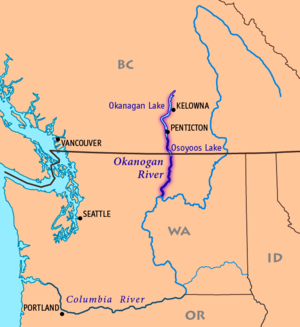The “Upper Columbia / Okanagan River 2021: One River, Ethics Matter” conference, hosted by Okanagan Nation Alliance and University of British Columbia Okanagan campus, will be held Nov. 17-18.
For Zoom webinar registration go here.
The conference focuses on “the history of the Columbia River Treaty and the treaty review process now underway and does so within a framework that emphasizes social and environmental justice, collaboration towards the common good, and the need for truth as well as reconciliation between Indigenous and non-Indigenous peoples. Some conference themes are treaty-specific while others focus on broader related topics such as the history of Indian residential schools and the calls to action of the Truth and Reconciliation Commission of Canada.”
The conference is held in a different location each year, alternating between the United States and Canada. The 2021 conference is co-hosted by the Okanagan Nation Alliance and the University of British Columbia Okanagan campus.
The main objective of next week’s two-day conference is to discuss the review process now underway to modernize the 57-year old Columbia River Treaty. Participants include traditional ecological knowledge keepers, environmental experts, along with academic and religious scholars from both sides of the 49th parallel.
Dr. Jeannette Armstrong, a Syilx knowledge keeper and UBCO associate professor who was recently appointed a Royal Society of Canada Scholar, will be one of several speakers at the event. Other leaders and panel experts include Grand Chief ʔaʔsiwɬ Stewart Phillip, who is president of the Union of British Columbia Indian Chiefs, Okanagan Indian Band Chief Byron Louis, University of Idaho Professor Emerita Barbara Cosens, along with Indigenous youth experts, historians, biologists, policy officials and Bishop Gregory Bittman of the Roman Catholic Church.
Pauline Terbasket, executive director of the Okanagan Nation Alliance, has been participating in the OREM conference since the first session in Spokane in 2014.
“These gatherings have been opportunities to feel the reality and impacts of colonization upon Indigenous Nations and the devastating impacts of the Columbia River Treaty. They also provide an opportunity to share stories that are familiar to all tribes along the Columbia River,” says Terbasket. “As the Indigenous people of the Columbia Basin, we are all salmon people, tied to the river for sustenance and to carry our responsibilities to care for all our lands, resources and peoples as we have since time immemorial.”
Also see:
— CBB, Dec. 3, 2020, SEVENTH ANNUAL ‘ONE RIVER, ETHICS MATTER’ VIDEO CONFERENCE TO FOCUS ON LOWER COLUMBIA RIVER ESTUARY, DISCUSS COLUMBIA RIVER TREATY https://columbiabasinbulletin.org/seventh-annual-one-river-ethics-matter-video-conference-to-focus-on-lower-columbia-river-estuary-discuss-columbia-river-treaty/
— CBB, Aug. 6, 2020, MODERNIZING COLUMBIA RIVER TREATY: B.C. REPORT ON COMMUNITY MEETINGS SAYS THIS TIME BASIN RESIDENTS, INDIGENOUS NATIONS WILL BE ‘MEANINGFULLY CONSULTED’ https://www.www.www.columbiabasinbulletin.org/modernizing-columbia-river-treaty-b-c-report-on-community-meetings-says-this-time-basin-residents-indigenous-nations-will-be-meaningfully-consulted/

